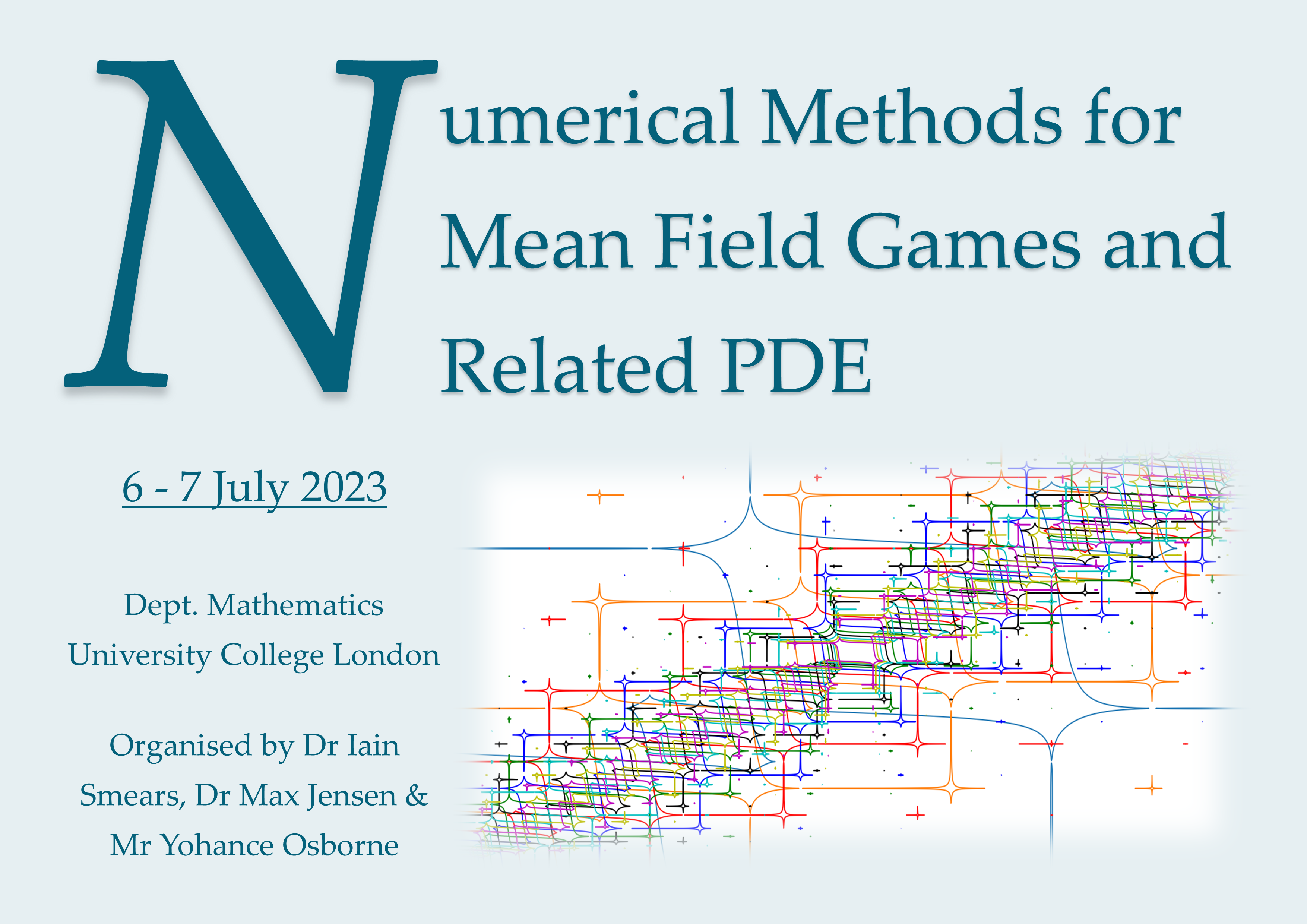Workshop: Numerical Methods for Mean Field Games and related PDE
Thursday 6 and Friday 7 July 2023
University College London




Topics
This workshop will gather leading UK and international researchers on the analysis, numerical approximation and applications of Mean Field Games (MFG) and related Partial Differential Equations such as Hamilton—Jacobi—Bellman equations. The workshop will gather experts on a wide range of topics, including but not limited to: numerical analysis of MFG and nonlinear PDE, PDE analysis, high-dimensional problems, optimal control and stochastic processes, scientific computing, as well as applications in financial mathematics and engineering.
Location
Department of Mathematics, University College London, 25 Gordon Street, WC1H 0AY, United Kingdom
Speakers
Gabriel Barrenechea (University of Strathclyde) (title and abstract)
A nodally bound-preserving finite element method
In this talk I will present a finite element method that respects the physical bounds of the underlying PDE at the nodes of the triangulation [BGPV23]. More precisely, I will present a method that enforces bound-preservation (at the degrees of freedom) of the discrete solution. The method is built by first defining an algebraic projection onto the convex closed set of finite element functions that satisfy the bounds given by the solution of the PDE. Then, this projection is hardwired into the definition of the method by writing a discrete problem posed for this projected part of the solution. Since this process is done independently of the shape of the basis functions, and no result on the resulting finite element matrix is used, then the outcome is a finite element function that satisfies the bounds at the degrees of freedom. Another important observation to make is that this approach is related to variational inequalities, and this fact will be exploited in the error analysis. The core of the talk will be devoted to explaining the main idea in the context of linear (and nonlinear) reaction-diffusion equations. The extension to convection-diffusion equations will also be discussed. If time allows, the extension of this method to nonvariational problems under Campanato-Cordes conditions will also be detailed.
The results in this talk have been carried out in collaboration with Abdolreza Amiri (Strathclyde, UK), Emmanuil Geourgoulis (Heriot-Watt, UK and NTUA Athens, Greece), Tristan Pryer (Bath, UK), and Andreas Veeser (Milan, Italy).
[BGPV23] G.R. Barrenechea, E. Georgoulis, T. Pryer, and A. Veeser, A nodally bound preserving finite element method. arXiv:2304.01067, 2023.
Elisabetta Carlini (Sapienza University of Rome) (title and abstract)
Lagrange Galerkin schemes for Mean Field Games
We propose a numerical approximation of a mean-field game system (MFG) with nonlocal couplings. The system is characterized by a backward Hamilton-Jacobi-Bellman equation coupled with a forward Fokker-Planck (FP) equation. The approximation is constructed by combining Lagrange-Galerkin techniques, for the FP equation, with semi-Lagrangian techniques, for the HJB equation. The resulting discrete system is solved using fixed-point iterations. We show that the scheme is conservative, consistent, and stable for large-time steps with respect to spatial steps. In the case of first-order MFG, we prove a convergence theorem for the exactly integrated Lagrange-Galerkin scheme in arbitrary spatial dimensions. In the case of second-order MFG, we construct an accurate high-order scheme. We propose an implementable version with inexact integration and finally show some numerical simulations. Joint works with F.J. Silva, E.Calzola, A. Zorkot
Roxana Dumitrescu (King's College London) (title and abstract)
A linear programming approach for mean-field games: theory and numerical aspects
In this talk, we present recent results on the linear programming approach to mean-field games in a general setting. This relaxed control approach allows to prove existence results under weak assumptions, and lends itself well to numerical implementation. We consider mean-field game problems where the representative agent chooses both the optimal control and the optimal time to exit the game, where the instantaneous reward function and the coefficients of the state process may depend on the distribution of the other agents. Furthermore, we establish the equivalence between mean-field games equilibria obtained by the linear programming approach and the ones obtained via other approaches used in the previous literature. We then present a fictious play algorithm to approximate the mean-field game population dynamics in the context of the linear programming approach.
Max Jensen (University College London) (title and abstract)
Dynamic Programming for Finite Ensembles of Nanomagnetic Particles
The stochastic Landau-Lifshitz-Gilbert equation describes magnetisation dynamics in ferromagnetic materials in a thermal bath. In this presentation, I discuss the optimal control of a finite spin system governed by the stochastic Landau-Lifshitz-Gilbert equation to guide the configuration optimally into a target state. The problem statement with a Bellman PDE on the state manifold is at the heart of our analysis. We show the wellposedness of the Bellman formulation and establish the regularity of the value function and the optimal controls to prove the existence of a strong solution to the optimal control problem. We present numerical experiments in a high-dimensional setting to further illustrate our findings. The talk is based on joint work with Ananta Majee (IIT Delhi), Andreas Prohl and Christian Schellnegger (Universitaet Tuebingen).
Dante Kalise (Imperial College London) (title and abstract)
Convex optimization methods for variational mean field games and related problems
In this talk we address the numerical approximation of Mean Field Games (MFG) with local couplings. For finite difference discretizations of the MFG system, we follow a variational approach and show that the discretised MFG can be obtained as the optimality system of a convex optimization problem. We study different proximal-type methods for convex, non-smooth optimization. These algorithms have several interesting features, such as global convergence, mass preservation, and stability with respect to the viscosity parameter. We present numerical experiments assessing the performance of the proposed methods, and discuss extensions related to gradient flows and mean field control. In collaboration with L. Briceño-Arias (UTFSM, CL) and F. J. Silva (Univ. Limoges, FR).
Alpar Meszaros (University of Durham) (title and abstract)
Mean field games and master equations through the lens of conservation laws
In this talk we present a new nonlinear transport equation written on the space of probability measures that allows to study mean field games and master equations. We will mainly consider deterministic problems. The point of view via this transport equation has two important consequences. First, this equation reveals a new monotonicity condition which is sufficient both for the uniqueness of MFG Nash equilibria and for the global in time well-posedness of master equations. Interestingly, this condition is in general in dichotomy with both the Lasry--Lions and displacement monotonicity conditions, studied so far in the literature. Second, in the absence of monotonicity, the conservative form of the transport equation can be used to define weak entropy solutions to the master equation. We construct several concrete examples to demonstrate that MFG Nash equilibria, whether or not they actually exist, may not be selected by the entropy solutions of the master equation. The talk will be based on joint works with J. Graber (Baylor University).
Yohance Osborne (University College London) (title and abstract)
Analysis and Numerical Approximation of Second-order Mean Field Game Partial Differential Inclusions
The PDE formulation of Mean Field Games (MFG) is described by nonlinear systems in which a Hamilton—Jacobi—Bellman (HJB) equation and a Kolmogorov—Fokker—Planck (KFP) equation are coupled. The advective term of the KFP equation involves a partial derivative of the Hamiltonian that is often assumed to be continuous. However, in many cases of practical interest, the underlying optimal control problem of the MFG may give rise to bang-bang controls, which typically lead to nondifferentiable Hamiltonians. In this talk we present results on the analysis and numerical approximation of second-order MFG systems for the general case of convex, Lipschitz, but possibly nondifferentiable Hamiltonians. In particular, we propose a generalization of the MFG system as a Partial Differential Inclusion (PDI) based on interpreting the partial derivative of the Hamiltonian in terms of subdifferentials of convex functions. We prove the existence of unique weak solutions to MFG PDIs under a monotonicity condition similar to one that has been considered previously by Lasry & Lions. Moreover, we introduce a monotone finite element discretization of the weak formulation of MFG PDIs and present theorems on the strong convergence of the approximations to the value function in the H1-norm and the strong convergence of the approximations to the density function in Lq-norms. We conclude the talk with some numerical experiments involving non-smooth solutions.
Tristan Pryer (University of Bath) (title and abstract)
Radiotherapy Treatment Planning for Charged Particles
Radiotherapy is a critical treatment modality in oncology, and optimising the delivery of radiation is crucial for ensuring patient safety and cancer treatment efficacy. We present work on formalising the radiotherapy treatment planning problem specifically tailored for charged particles and heavy ions. After introducing the problem, we discuss models and model reductions aimed at simplifying the complex physics involved in charged particle and heavy ion therapy. These reductions are necessary for computational efficiency and practical implementation while preserving the essential characteristics of the treatment process.
We delve into the mathematical foundation of the problem and demonstrate the well-posedness assuring the existence, uniqueness, and stability of solutions, providing a solid theoretical basis for developing efficient and reliable treatment planning algorithms. We examine some numerical approximations that facilitate the computation of treatment plans. These approximations strike a balance between accuracy and computational cost, enabling feasible solutions within clinical timeframes. We evaluate the performance of these approximations and discuss their limitations and trade-offs.
Finally, we investigate the associated stochastic process to link to Monte-Carlo simulations commonly utilised in clinical practice. Stochastic fluctuations in particle transport and interaction processes can impact treatment outcomes, and understanding the underlying stochastic nature is essential for the development and validation of robust Monte-Carlo-based treatment planning methodologies.
Christoph Reisinger (University of Oxford) (title and abstract)
A posteriori error estimates for fully coupled McKean–Vlasov forward-backward SDEs
Joint work with Wolfgang Stockinger and Yufei Zhang
Fully coupled McKean–Vlasov forward-backward stochastic differential equations (MV-FBSDEs) arise naturally from large population optimization problems. Judging the quality of given numerical solutions for MV-FBSDEs, which usually require Picard iterations and approximations of nested conditional expectations, is typically difficult. This paper proposes an a posteriori error estimator to quantify the L2-approximation error of an arbitrarily generated approximation on a time grid. We establish that the error estimator is equivalent to the global approximation error between the given numerical solution and the solution of a forward Euler discretized MV-FBSDE. A crucial and challenging step in the analysis is the proof of stability of this Euler approximation to the MV-FBSDE, which is of independent interest. We further demonstrate that, for sufficiently fine time grids, the accuracy of numerical solutions for solving the continuous MV-FBSDE can also be measured by the error estimator. The error estimates justify the use of residual-based algorithms for solving MV-FBSDEs. Numerical experiments for MV-FBSDEs arising from mean field control and games confirm the effectiveness and practical applicability of the error estimator.
Smita Sahu (University of Portsmouth) (title and abstract)
An efficient filtered scheme for some first order time-dependent Hamilton-Jacobi equations
We introduce a new class of filtered schemes for some first order non-linear Hamilton-Jacobi equations. The work follows recent ideas of Froese and Oberman (SIAM J. Numer. Anal., Vol 51, pp.423-444, 2013) and Oberman and Salvador (J. Comput. Phys., Vol 284, pp. 367-388, 2015) for steady equations. Here we mainly study the time dependent setting and focus on fully explicit schemes. Furthermore, specific corrections to the filtering idea are also needed in order to obtain high-order accuracy. The proposed schemes are not monotone but still satisfy some epsilon-monotone property. A general convergence result together with a precise error estimate of order h^1/2 is given (h is the mesh size). The framework allows to construct finite difference discretizations that are easy to implement and high-order in the domain where the solution is smooth. A novel error estimate is also given in the case of the approximation of steady equations. Numerical tests including evolutive convex and nonconvex Hamiltonians and obstacle problems are presented to validate the approach. We show with several examples how the filter technique can be applied to stabilize an otherwise unstable high-order scheme.
This is joint work with O. Bokanowski and M. Falcone.
Schedule
Thursday 6 July
10.00–10.30: Welcome and registration
10.30–12.30: Lectures
12.30–13.30: Lunch break
13.30–15.30: Lectures
15.30–16.00: Coffee break
16.00–17.00: Lecture
Friday 7 July
09.00–10.00: Lecture
10.00–10.30: Coffee break
10.30–12.30: Lectures
12.30–13.30: Lunch break
13.30–15.30: Lectures
15.30–16.00: Coffee break and farewell